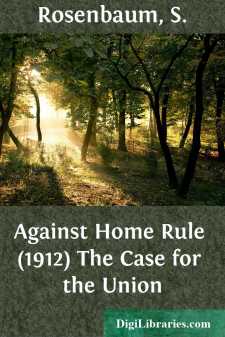Categories
- Antiques & Collectibles 13
- Architecture 36
- Art 48
- Bibles 22
- Biography & Autobiography 813
- Body, Mind & Spirit 142
- Business & Economics 28
- Children's Books 15
- Children's Fiction 12
- Computers 4
- Cooking 94
- Crafts & Hobbies 4
- Drama 346
- Education 46
- Family & Relationships 57
- Fiction 11828
- Games 19
- Gardening 17
- Health & Fitness 34
- History 1377
- House & Home 1
- Humor 147
- Juvenile Fiction 1873
- Juvenile Nonfiction 202
- Language Arts & Disciplines 88
- Law 16
- Literary Collections 686
- Literary Criticism 179
- Mathematics 13
- Medical 41
- Music 40
- Nature 179
- Non-Classifiable 1768
- Performing Arts 7
- Periodicals 1453
- Philosophy 64
- Photography 2
- Poetry 896
- Political Science 203
- Psychology 42
- Reference 154
- Religion 513
- Science 126
- Self-Help 84
- Social Science 81
- Sports & Recreation 34
- Study Aids 3
- Technology & Engineering 59
- Transportation 23
- Travel 463
- True Crime 29
Against Home Rule (1912) The Case for the Union
by: S. Rosenbaum
Categories:
Description:
Excerpt
The object of the various essays collected in this book is to set out the case against Home Rule for Ireland, and to re-state Unionist policy in the light of the recent changes in that country. The authors are not, however, to be regarded as forming anything in the nature of a corporate body, and no collective responsibility is to be ascribed to them. Each writer is responsible for the views set out in his own article, and for those alone. At the same time, they are all leaders of Unionist thought and opinion, and their views in the main represent the policy which the Unionist Government, when returned to power, will have to carry into effect.
Among the contributors to the book are an ex-Premier, four ex-Chief Secretaries for Ireland, an ex-Lord Lieutenant, two ex-Law officers, and a number of men whose special study of the Irish question entitles them to have their views most carefully considered when the time comes for restoring to Ireland those economic advantages of which she has been deprived by political agitation and political conspiracy. At the present moment the discussion of the Irish question is embittered by the pressing and urgent danger to civil and religious liberties involved in the unconditional surrender of the Government to the intrigues of a disloyal section of the Irish people. It is the object of writers in this book to raise the discussions on the Home Rule question above the bitter conflict of Irish parties, and to show that not only is Unionism a constructive policy and a measure of hope for Ireland, but that in Unionist policy lies the only alternative to financial ruin and exterminating civil dissensions.
We who are Unionists believe first and foremost that the Act of Union is required—in the words made familiar to us by the Book of Common Prayer—"for the safety, honour and welfare, of our Sovereign and his dominions." We are not concerned with the supposed taint which marred the passing of that Act; we are unmoved by the fact that its terms have undergone considerable modification. We do not believe in the plenary inspiration of any Act of Parliament. It is not possible for the living needs of two prosperous countries to be bound indefinitely by the "dead hand" of an ancient statute, but we maintain that geographical and economic reasons make a legislative Union between Great Britain and Ireland necessary for the interests of both. We see, as Irish Ministers saw in 1800, that there can be no permanent resting place between complete Union and total separation. We know that Irish Nationalists have not only proclaimed separatist principles, but that they have received separatist money, on the understanding that they would not oppose a movement to destroy whatever restrictions and safeguards the Imperial Parliament might impose upon an Irish Government.
The first law of nature with nations and governments, as with individuals, is self-preservation. It was the vital interests of national defence that caused Pitt to undertake the difficult and thankless task of creating the legislative union. If that union was necessary for the salvation of England and the foundation of the British Empire, it is assuredly no less necessary for the continued security of the one and the maintenance and prestige of the other.
Mr. J.R. Fisher, in his historical retrospect, shows us how bitter experience convinced successive generations of English statesmen of the dangers that lay in an independent Ireland. One of the very earliest conflicts between the two countries was caused by the action of the Irish Parliament in recognising and crowning a Pretender in Dublin Castle. Then the fact that the Reformation, which soon won the adherence of the English Government and the majority of the English people, never gained any great foothold in Ireland, caused the bitter religious wars which devastated Europe to be reproduced in the relations of the two countries....


